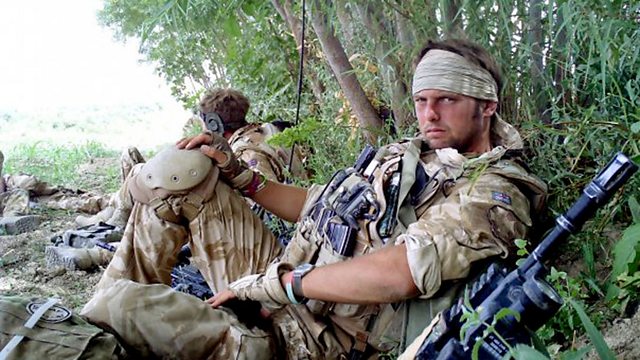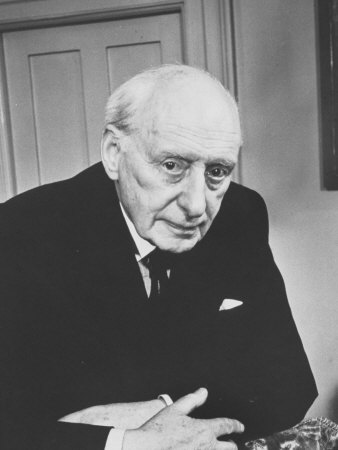The great PTSD conundrum
Why do 20% of American soldiers develop Post-Traumatic Stress Disorder (PTSD), and only 3-5% of British soldiers? It’s one of the great conundrums of contemporary psychology / psychiatry - and one of the most contentious, touching as it does on sensitive issues of our countries’ moral characters, and how well our governments care for their soldiers.

The question was revisited this week by a moving Panorama documentary called Broken by Battle, made by Sunday Times journalist Toby Harnden, who won the 2012 Orwell Prize for his book Dead Men Risen, about his time with the Welsh Guards in Afghanistan. The programme traced a sharp rise in the number of suicides among troops who served in Afghanistan, and suggested the Ministry of Defence is not doing enough to help soldiers coming home with PTSD.
Toby tells me:
While I was in Helmand, I’d see instances of ‘battle shock’, where soldiers would freeze in battle, curl up into the foetal position, and be helicoptered away. I’d wonder what would happen to them. I’d heard a bit about PTSD, but I wondered if it was real or some slightly nebulous condition like Gulf War Syndrome. But out in Helmand I got to know staff sergeant Dan Collins, who developed PTSD and subsequently killed himself.
The Panorama programme explores how Dan was sectioned in an NHS mental care facility, and what a blow that was to his pride as a brave soldier (the Army used to have its own psychiatric facility but closed it). We are then shown Dan’s last words, recorded on his phone when he had left his wife and retreated to the hills, self-exiled from human society. We see him, desperately alone, wearing his military kit and the bandana he wore in Afghanistan. He apologises to his mum for being ‘a bit selfish’ in killing himself, and asks for a full military funeral. We’re told that, shortly afterwards, he hung himself from a tree.
Toby says:
After writing Dead Men Risen, I moved to the US, and saw the staggering statistics of PTSD and veteran suicide in the US armed forces. They had clearly identified a huge problem there, while in the UK armed forces, the attitude seemed to be ‘nothing to see here’.
So why the dramatic difference in PTSD rates among US and UK veterans? This is where it gets controversial. UK military psychiatrists like Simon Wessely, director of the King’s Centre for Military Health Research, suggests it’s because the British army is older, has more officers and fewer reservists, and shorter tours of duty - all of which implies that if the US did things differently, it would have a much lower level of PTSD among its veterans. US military psychiatrists bristle at such suggestions, and point out that US soldiers were in much heavier fighting in Iraq - only 32% of UK soldiers reported coming under small arms fire, compared with more than 90% of US soldiers.
US psychiatrists also suggest that cultural differences play a role, and that the British ‘stiff upper lip’ means that (in the words of a New Yorker blog) British veterans are ‘less likely to be told they have PTSD. They are more likely, in turn, to end up abusing alcohol or to be given the less controversial diagnosis of clinical depression, according to William Nash, a retired U.S. Navy psychiatrist and co-editor of an influential cross-cultural anthology on PTSD, ‘Combat Stress Injury: Theory, Research and Management.’
Harnden’s view, meanwhile, is that the Ministry of Defence wants to limit its financial liability for PTSD, so it is deliberately underplaying the scale of the problem. His documentary explored how the MoD don’t keep track of PTSD levels among discharged soldiers, nor of suicide statistics once soldiers have left the Army (although a report will be published on that next year). He also showed how veterans often fall between the cracks of the MoD and the NHS. We have a minister for veterans, Mark Francois, but apparently he doesn’t have responsibility for veterans’ healthcare (so what does he do?). The US has a Department for Veterans and the Pentagon spends a huge amount trialling new therapies for PTSD, both in treatment and in prevention.

Harnden also points out that the Kings Centre for Military Health, our main source for PTSD incidence in British soldiers and veterans, is mainly funded by the MoD. The head of that Centre, Simon Wessely, retorts that the Panorama programme was one-sided in its exploration of the issue, and that its ‘shock horror’ statistic that more veterans committed suicide last year than were killed in Helmand is sensationalist rather than statistically meaningful. Simon also suggests that the reason PTSD incidence appears to be going up in UK troops could be because stigma about it is slowly being reduced - which is a good thing.
Both, ultimately, want to help British soldiers, and if PTSD is rising among our troops, that may be because of the intense fighting in Afghanistan in the last few years. So how could the MoD do more for our soldiers and veterans? The families of soldiers who committed suicide have drawn up a petition, which has seven demands:
1) Medical notes should be automatically passed onto GPs after a soldier is discharged. (This is to try to get the MoD and NHS to link up better).
2) The Army should carry out mandatory welfare checks on soldiers every six months after being discharged as per the recommendations of the ‘Fighting Fit’ mental health policy paper drawn up by Dr Andrew Murrison MP.
3) There should be residential units to treat all serving soldiers and veterans suffering with PTSD.
4) Serving soldiers should be able to access NHS services.
5) To reduce waiting lists for veterans seeking help for mental health related issues. Waiting lists are currently too long and it should not be left to charities to deal with this problem.
6) Soldiers should be able to ask for help with mental health issues without it going on their permanent Army records.
7) Soldiers’ families should be informed about the symptoms of Post Traumatic Stress Disorder(PTSD) and other mental health related illnesses.
You can sign the petition here.
Permission to be hurt
If there is still a ‘stiff upper lip’ in the British military, then I’d suggest that the military (and all of us) need to broaden our conception of male strength, to incorporate the Stoic idea that being strong means knowing how to take care of yourself, rather than taking out your problems on yourself and those around you. That definition of ‘Stoic’ is not the same as denying or bottling up your feelings, which is how some people misinterpret stoicism.
Personally, I was diagnosed with PTSD when I was 20, and I bottled it up for years out of a sense of shame at my weakness and foolishness (there was nothing heroic about my wound - I’d done too many drugs). Funnily enough, one of the things that helped me come to terms with my woundedness was a book about shell-shock by my great-grandfather, Lord Moran, called Anatomy of Courage.

My great-grandfather was a doctor serving in the trenches during the Somme. I was particularly touched by one passage where he admitted his own fear and woundedness. He wrote of how, during the Somme, the man next to him was obliterated by a German shell: "I had a feeling as if I was physically hurt though I was not touched, the will to do the right thing was for a moment stunned...The war had never been the same since, something in the will had snapped...At the time I do not think I was much frightened, I was too stunned to think. But it took its toll later. I was to go through it many times in my sleep...Even when the war had begun to fade out of men’s minds I used to hear all at once the sound of a shell coming."
My great-grandad went on to do great things - he was Churchill’s doctor during the War - but what touched me was that brave moment of vulnerability and candour in his writing. Even though there is a vast difference between him getting shell-shock in the trenches, and me traumatizing myself with LSD, it still seemed to give me a sort of permission to be wounded.
*******
In other news:
Talking of the stiff upper lip, this excellent short essay by GK Chesterton argues that the stiff upper lip was invented by decadent aristocrats in the Edwardian era and that actually manly Brits are fine with sobbing like babies.
Cary Cooper, guru of well-being at work at Lancaster University, has published a massive book called Well-Being: A Complete Reference Guide. So that's that sorted then.
Here's an interesting initiative: http://www.philosophydinners.org/
City AM, of all places, looks at the revival of the liberal trivium in education and business.
Daniel Dennett gives an interesting interview on religion, why Jesus is a good role model and why we need secular places that make us feel special and loved.
This week I've been pondering whether and how ecstatic / revelatory experiences can be 'tested out'.
Danny Fox of Frieze considers pretentiousness with reference to Eno and Paris is Burning.
The Stoned Age: were cavemen on drugs? Would the Bronze Age have happened quicker if they weren't?
Finally, the LA Review of Books reviews an interesting-sounding book by Dutch philosopher Peter Sloterdijk, arguing for a spirituality based on the idea of practice, with the goal of saving humanity from itself. Interesting - although the Nietzchean / Foucaultian idea of spirituality as care of the self, which Sloterdijk draws on, is highly individualistic and ignores the idea of religion as relational - as a relationship not just with your self but with your community and God. It also, perhaps, ignores ecstatic experience and the idea of people feeling a connection with God.
However, the title of the book, You Must Change Your Life, hints at the idea of hearing a divine voice - it comes from a brilliant poem by Rilke, where he stands in front of a headless statue of Apollo, god of prophecy (on the right), and seems to hear a voice telling him 'you must change your life'. Is that his own projection, or the God speaking to him from the ruins of antiquity? Here's the poem, 'Archaic Torso of Apollo' in translation:
We cannot know his legendary head
with eyes like ripening fruit. And yet his torso
is still suffused with brilliance from inside,
like a lamp, in which his gaze, now turned to low,
gleams in all its power. Otherwise
the curved breast could not dazzle you so, nor could
a smile run through the placid hips and thighs
to that dark center where procreation flared.
Otherwise this stone would seem defaced
beneath the translucent cascade of the shoulders
and would not glisten like a wild beast's fur:
would not, from all the borders of itself,
burst like a star: for here there is no place
that does not see you. You must change your life.
See you next week,
Jules

